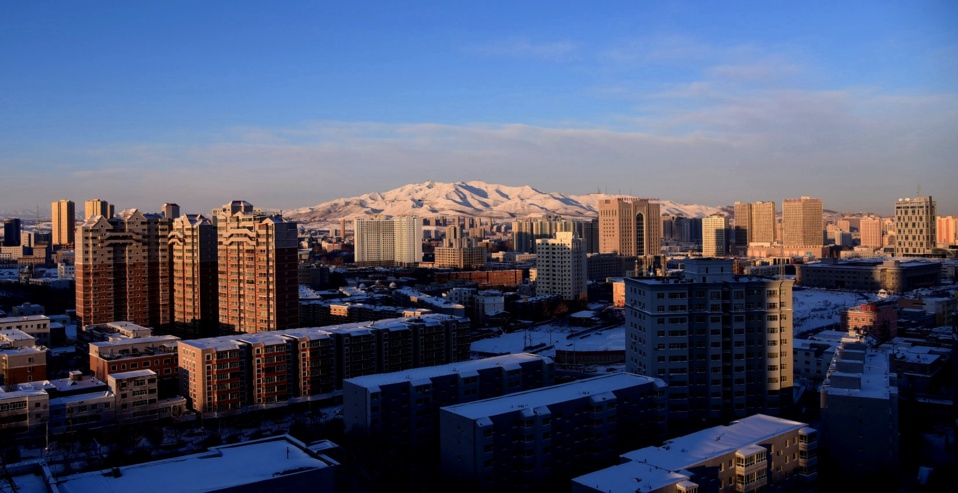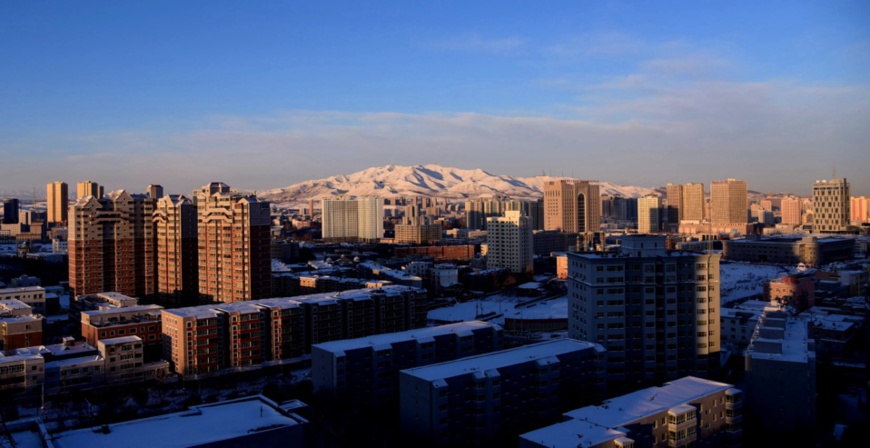By Li Ya’nan, People’s Daily
Large-scale housing renovation for shantytowns and old residential buildings was carried out by the government of Urumqi, China’s Xinjiang Uygur Autonomous Region this year, benefitting a total of 91,000 households in the city.
The government renovated residents’ kitchens and bathrooms, as well as water supply and drainage systems. Besides, old buildings have also been installed with elevators. So far, most of these projects have been finished.
The building where Mei Zuyuan, a 77-year-old Urumqi citizen lives was installed with an elevator. “It’s much easier to go up and down with the elevator,” Mei said.
Adili Suronduk who lives in the same residential area with Mei, was always troubled by sewage clogging. “The government’s renovation projects of kitchens, bathrooms and sewage pipelines solved big problems for us,” the man said.
The newly added insulating layers of the buildings, road expansion of the residential area, as well as the cables newly buried all lifted the appearance the community where he has lived for over 20 years, Adili told People’s Daily.
Zhu Zuocheng, director of the quality inspection office for engineering projects of Saybag District, Urumqi said that the district was helping old residential areas in the district renovate their buildings, and around 120,000 residents from 30,300 households will benefit from the project.
“The renovation includes elevator installation, kitchen and bathroom makeover, energy-saving projects and improvement of supporting facilities in residential areas,” Zhu said.
“They decorated our kitchen and bathroom even better than we did, making our home more comfortable,” said Zhao Yongqiang who lives in a residential area near Xinjiang Uygur Autonomous Region Museum. 650 neighbors of him in the area renovated their houses this time, and the expenses were partially shouldered by the government.
“We are more than happy to see the drastic changes of our living environment, and we didn’t pay much,” Zhao noted.
Kyimu Abuliz is a man who had a profound experience of the changes happening to the living environment. He and his family lived in a small house of only a dozen of square meters in Heijiashan neighborhood where unapproved constructions prevailed and sewage flew everywhere. According to him, he had to fetch water outside the region and heat his house by coal-burning.
Now, after housing demolition and reconstruction, the neighborhood has been turned into one with modern buildings surrounded by trees and flowers, and the residents are living in harmony. A 2,500-square meter comprehensive farm produce market was built near the neighborhood to offer daily necessities for the residents.
Kyimu now lives in an 80-suqare meter house and secures a job under the assistance of local government.
Since Xinjiang launched the “Livelihood-building Year” initiative in 2010, at least 70 percent of the regional government’s public fiscal expenditure has been spent on improving livelihood. As the government rolls out constant projects to advance public welfare, the difficulties of the people have been tackled one after another. The efforts to improve people’s livelihood, as well as the efficiency and results, are all unprecedented.
The government renovated residents’ kitchens and bathrooms, as well as water supply and drainage systems. Besides, old buildings have also been installed with elevators. So far, most of these projects have been finished.
The building where Mei Zuyuan, a 77-year-old Urumqi citizen lives was installed with an elevator. “It’s much easier to go up and down with the elevator,” Mei said.
Adili Suronduk who lives in the same residential area with Mei, was always troubled by sewage clogging. “The government’s renovation projects of kitchens, bathrooms and sewage pipelines solved big problems for us,” the man said.
The newly added insulating layers of the buildings, road expansion of the residential area, as well as the cables newly buried all lifted the appearance the community where he has lived for over 20 years, Adili told People’s Daily.
Zhu Zuocheng, director of the quality inspection office for engineering projects of Saybag District, Urumqi said that the district was helping old residential areas in the district renovate their buildings, and around 120,000 residents from 30,300 households will benefit from the project.
“The renovation includes elevator installation, kitchen and bathroom makeover, energy-saving projects and improvement of supporting facilities in residential areas,” Zhu said.
“They decorated our kitchen and bathroom even better than we did, making our home more comfortable,” said Zhao Yongqiang who lives in a residential area near Xinjiang Uygur Autonomous Region Museum. 650 neighbors of him in the area renovated their houses this time, and the expenses were partially shouldered by the government.
“We are more than happy to see the drastic changes of our living environment, and we didn’t pay much,” Zhao noted.
Kyimu Abuliz is a man who had a profound experience of the changes happening to the living environment. He and his family lived in a small house of only a dozen of square meters in Heijiashan neighborhood where unapproved constructions prevailed and sewage flew everywhere. According to him, he had to fetch water outside the region and heat his house by coal-burning.
Now, after housing demolition and reconstruction, the neighborhood has been turned into one with modern buildings surrounded by trees and flowers, and the residents are living in harmony. A 2,500-square meter comprehensive farm produce market was built near the neighborhood to offer daily necessities for the residents.
Kyimu now lives in an 80-suqare meter house and secures a job under the assistance of local government.
Since Xinjiang launched the “Livelihood-building Year” initiative in 2010, at least 70 percent of the regional government’s public fiscal expenditure has been spent on improving livelihood. As the government rolls out constant projects to advance public welfare, the difficulties of the people have been tackled one after another. The efforts to improve people’s livelihood, as well as the efficiency and results, are all unprecedented.
 Menu
Menu
 Xinjiang’s Urumqi renovates old residential buildings, benefiting over 90,000 households
Xinjiang’s Urumqi renovates old residential buildings, benefiting over 90,000 households

















